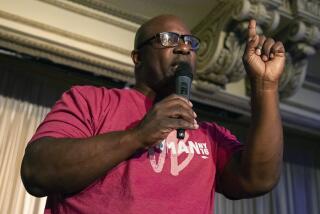GOP Bid to Win Edge in Senate Faces Stiff Fight
- Share via
WASHINGTON — “I lived a lot of places,” concedes Republican Pete Dawkins, as he explains why he moved to New Jersey last year to run for the U.S. Senate. “But I have to tell you that throughout all those years, in all those places, I never found a single place that had as good people or as much promise as I’ve found here in our Garden State.”
His words are being aired regularly on television in New Jersey these days, but Dawkins is not the least bit happy about it. In fact, those two sentences have become the centerpiece of what so far appears to be a highly successful television advertising campaign by the Democrats designed to discredit Dawkins by portraying him as a carpetbagger.
“Come on, Pete,” the ad concludes. “Be real!”
On the Defensive
A year ago, Dawkins, a former West Point football star, Rhodes scholar and Army brigadier general, was viewed as the Republicans’ star candidate and symbol of a strenuous GOP effort to regain control of the Senate, which Democrats now hold by a 54-46 edge. But with only six weeks left before the Nov. 8 election, he is clearly being put on the defensive by the man who Republicans previously believed to be the most vulnerable Democratic incumbent in the Senate: Frank R. Lautenberg.
Lautenberg’s unexpected resiliency is symptomatic of the difficulties that Republican Senate challengers are encountering this year, even in states such as New Jersey, where GOP presidential candidate George Bush expects to have an edge.
Unfortunately for the GOP, experts in both parties are now skeptical that anything less than a Bush landslide in November could precipitate a shift in Senate leadership from the Democrats to the Republicans, as Ronald Reagan’s election did in 1980.
At least two Republican incumbents--Sens. Chic Hecht of Nevada and David Karnes of Nebraska--are battling formidable Democratic challengers.
So far, the Democrats’ only real disappointment has been the failure of Hubert H. Humphrey III, the party’s star Senate candidate this year and son of the late vice president, to capitalize on what party experts saw as the political weaknesses of incumbent Republican Sen. Dave Durenberger of Minnesota. Despite Humphrey’s well-known name, Durenberger appears to be headed for reelection.
Meanwhile, the Democrats’ own most vulnerable incumbents, such as Lautenberg and Sen. Howard M. Metzenbaum of Ohio, have shown remarkable staying power against star GOP candidates. Even Spark M. Matsunaga of Hawaii and Quentin N. Burdick of North Dakota, two elderly Democratic senators with health problems, appear in no real danger of losing their seats.
According to most polls, no Republican Senate challenger has yet come within 15 percentage points of any Democratic incumbent, said Sen. John Kerry of Massachusetts, chairman of the Democratic Senatorial Campaign Committee. Meanwhile, he said, Democratic challengers are leading Hecht and Karnes, and several others are within 15 points.
“More of their incumbents are being challenged than ours and by stronger challengers,” noted Kerry. “The battleground is on their turf and that’s where we want it.”
Perhaps the only prospect for a Democratic setback exists in the so-called “open” Senate seats, where incumbents are not seeking reelection.
Three of these seats belong to the Democrats, and Republicans believe they have a fighting chance in all three. But three others are held by Republicans, and one--Virginia--is virtually certain to be taken away by former Democratic Gov. Charles S. Robb.
While Republicans may spend as much as four times as much money on the Senate elections as Democrats, even Sen. Rudy Boschwitz of Minnesota, who heads the National Republican Senatorial Committee, predicts only “some gain” for his party in November, not enough for a GOP takeover of the Senate.
“We’re behind, so it’s uphill,” Boschwitz conceded.
Complete Surprise
In New Jersey, where Dawkins is believed to be trailing by 15 percentage points, the race has come as a complete surprise to political professionals, who viewed Lautenberg as highly vulnerable. The incumbent was elected in 1982 with only 51% of the vote and has failed to establish a clear identity for himself in a state that boasts two of the biggest stars in American politics--Democratic Sen. Bill Bradley and Republican Gov. Thomas H. Kean.
Dawkins, like Bradley, had been a Rhodes scholar and a sports hero. But his campaign has erred on several occasions, ironically by exaggerating the qualifications of a candidate whose credentials would seem to need no embellishment.
Not only did his campaign literature make the erroneous claim that he had been wounded in action in Vietnam, but the candidate himself exaggerated his war record by falsely stating that he had been a “military combat commander.” In addition, Dawkins contended that as an investment banker after retiring from the Army he “transformed . . . the whole character of investment banking”--a recollection that his former Wall Street colleagues do not share.
In addition, Dawkins offended many small-towners in New Jersey by confiding to a reporter that “I’d blow my brains out if I had to live in a small town.”
But Lautenberg, whose campaign has by no means been flawless, did not move to strengthen his lead over Dawkins until recently, when he began airing 30-second television ads reciting his opponent’s explanation for moving from Manhattan to New Jersey.
“We felt that there was a tone of insincerity there that raised a lot of questions,” Lautenberg explained.
Dawkins is far from conceding defeat. In fact, his press secretary, Joe Wagner, contends that the Lautenberg strategy will eventually backfire because it is “too negative” and because his ad gives Dawkins “23 seconds of free air time” every time it is broadcast. “We are calling it Lautenberg’s million-dollar mistake,” he said.
Like Lautenberg, Metzenbaum, a flamboyant liberal, was thought to be an easy GOP target this year in a state that appears to be increasingly conservative. His opponent, popular Cleveland Mayor George Voinovich, was expected to cut into Metzenbaum’s strong political base in the state’s northeastern corner--where Cleveland is located.
Tireless Fund-Raiser
But Metzenbaum, a tireless fund-raiser, has proved tougher than Republicans had expected and now leads in polls by anywhere from 10 to 21 percentage points. Moreover, Democratic strategists claim that Voinovich is hurting himself by running what one of them called “easily the dirtiest campaign in the country.”
Voinovich’s most controversial tactic has been to accuse Metzenbaum of being soft on child pornography and being the chief opponent in the Senate Judiciary Committee of legislation known as the 1988 Child Pornography and Enforcement Act.
“That’s ridiculous,” huffed Metzenbaum. “Nobody supports child porn; everybody is opposed to child pornography. I think we’re going to prevail, even though we’ve had a spate of negative, sleazy television commercials used against us.”
As evidence that Voinovich’s negative campaign has backfired, Metzenbaum noted that the Dayton Daily News recently endorsed him, far earlier than the paper usually makes endorsements in an election year, on grounds that Voinovich’s campaign has been too nasty.
In the Republican camp, however, Hecht and Karnes have not been as successful as Metzenbaum and Lautenberg in fending off serious challengers.
Karnes, who was appointed to the Senate last year to fill the unexpired term of the late Sen. Ed Zorinsky (D-Neb.), is believed to be running more than 15 percentage points behind Robert Kerrey, the popular former governor who is best known nationally for having dated actress Debra Winger.
And Hecht not only has a tough challenger in Gov. Richard H. Bryan, but he also is battling a flood of bad publicity. A poll by political scientists gave him the lowest rating for effectiveness in the Senate, and a Wall Street Journal article characterized him as a bumbler who is frequently ridiculed or ignored in Washington.
In the four hotly contested open seats, by contrast, no strong trend has emerged.
Robb is assured of taking Virginia for the Democrats, and in Vermont, Republican Rep. James M. Jeffords appears likely to retain the seat of retiring Sen. Robert T. Stafford.
Up for Grabs
But the other four states--Florida, Mississippi and Wisconsin, where Democrats are retiring, and Washington, where the incumbent is a Republican--are up for grabs.
In Florida, in fact, the Democratic nominee to replace retiring Democrat Lawton Chiles will not even be chosen until Tuesday, when Rep. Buddy MacKay and state Insurance Commissioner Bill Gunter meet in a primary runoff. Democrats concede the winner will be at a disadvantage against the well-known Republican nominee, Rep. Connie Mack, grandson of the longtime owner-manager of the Philadelphia Athletics, who sewed up his party nomination on Sept. 6.
“It’s going to be a tough race,” said Massachusetts Sen. Kerry. “The winner will have about five weeks to heal the wounds and raise money.”
Likewise, in Washington, where GOP Sen. Daniel J. Evans is retiring, time also has been running on the side of the Republican. Former Republican Sen. Slade Gorton, who was turned out of office two years ago, has been campaigning as the GOP nominee for months, but his opponent, Democratic Rep. Mike Lowry, was not chosen until Sept. 20.
In Mississippi, Assistant House Republican leader Trent Lott appears to be running slightly ahead in the race to replace the Democrats’ retiring elder statesman, John C. Stennis. But his opponent, Democratic Rep. Wayne Dowdy, appears to be making inroads with a highly unusual issue: the $50,000-a-year salary of Capitol policeman George Awkward, who is assigned to protect Lott. Dowdy seeks to underscore Lott’s votes to cut federal benefits with the refrain: “Let’s cut George, not Social Security.”
There is also a lively contest in Wisconsin for the right to succeed retiring Democratic maverick William Proxmire. Republicans have nominated the only woman in a Senate race this year, 36-year-old state Senate Majority Leader Susan Engeleiter. Democrats are backing Herb Kohl, owner of the Milwaukee Bucks basketball team, whose expenditure of millions of dollars of his own money on the race has become a key issue. Proxmire never spent more than a few hundred dollars.
Although most Senate incumbents standing for reelection are believed to be unshakable, neither party can rule out a few surprises. Democrats are hoping for upsets of Republicans Sens. John H. Chafee of Rhode Island, Malcolm Wallop of Wyoming and Lowell P. Weicker Jr. of Connecticut. Republicans think Burdick and Democratic Sens. John Melcher of Montana and Jeff Bingaman of New Mexico might be vulnerable.
Yellowstone Controversy
Chafee is being challenged by Lt. Gov. Richard Licht in a state where Dukakis is popular. Wallop, up against state Sen. John Vinich, is being asked to answer for the Administration’s controversial fire-fighting procedures in Yellowstone National Park. And Weicker’s challenger is popular state Atty. Gen. Joe Lieberman.
Melcher, although a popular figure in his home state, is up against well-known farm broadcaster Conrad Burns. Bingaman, whose name recognition is unusually low for an incumbent, is fending off a challenge from state Sen. William Valentine. Burdick, despite recent surgery, is still considerably ahead of his challenger, state legislator Earl Strinden.
More to Read
Get the L.A. Times Politics newsletter
Deeply reported insights into legislation, politics and policy from Sacramento, Washington and beyond. In your inbox twice per week.
You may occasionally receive promotional content from the Los Angeles Times.










